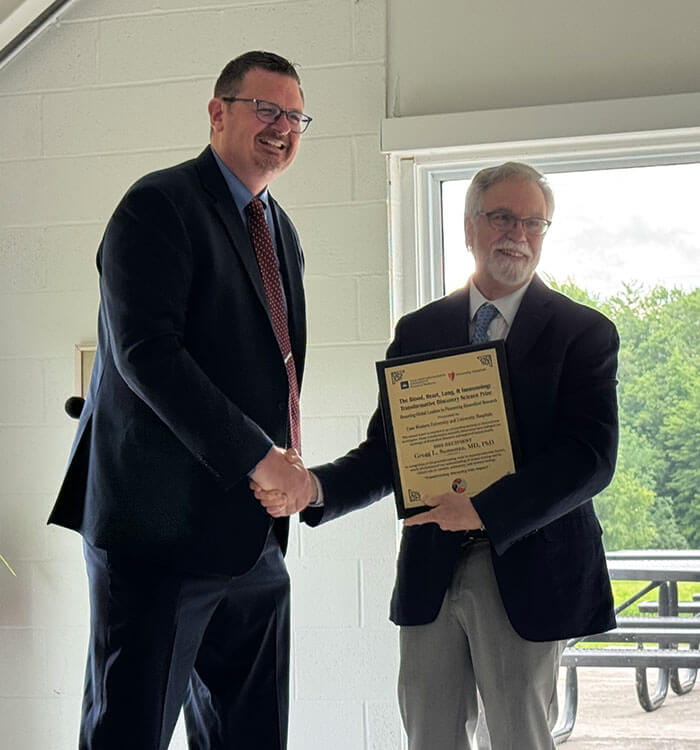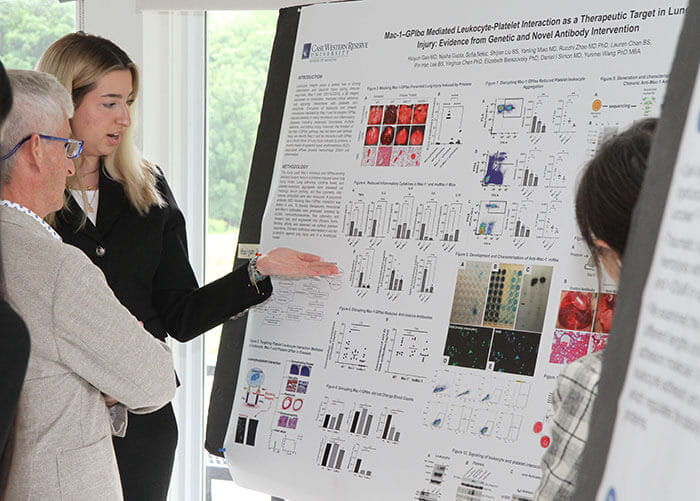Inaugural Blood, Heart, Lung & Immunology Research Center Science Day Drives Home the Benefits of Multidisciplinary Scientific Collaborations
July 17, 2025
UH Research & Education Institute
The inaugural Science Day for the Blood, Heart, Lung & Immunology (BHLI) Research Center, a joint venture between University Hospitals and Case Western Reserve University (CWRU) School of Medicine, took place on Tuesday, June 17, 2025.
The event titled, “Frontiers in Blood, Heart, Lung & Immunology: Transforming Discovery into Impact,” brought together a broad spectrum of trainees, clinicians and investigators for a thought-provoking day of scientific presentations, question and answer exchanges, and networking. With nearly 100 science-focused individuals in attendance, the event showcased the power of multidisciplinary team science and collaboration in accelerating the translation of basic research. This helps pave the way for the development of new diagnostic and therapeutic approaches that can directly benefit patients with blood, heart, lung and immunologic diseases.
“This (event) represented more than a gathering of great minds,” says Kenneth Remy, MD, MHSc, MSCI, director of the BHLI Center. “It marked the launch of a bold and interdisciplinary vision for research at University Hospitals and Case Western Reserve University School of Medicine, a vision that brings together basic, translational, clinical and populations scientists around a shared mission to understand mechanisms of disease and improve human health across systems and lifespan.”
The daylong program encouraged connections among researchers across all career stages, early, mid, and senior, to cultivate collaborations, cross-pollinate ideas, share resources and knowledge, and shed light on scientific approaches and methodologies, that ultimately could inspire or help others with their research endeavors. “Talking to people, asking questions, finding commonalities to form some type of collaboration is a great way to advance your science,” William Schiemann, PhD, Dean of Research at CWRU, said at the event.
About the BHLI Research Center
The BHLI Center is dedicated to establishing a comprehensive, collaborative program that champions transformative leadership in research, training and education for discovery scientists. This new research center brings together the Cardiovascular Research Institute (CVRI) and comprehensively adds hematology and immunology discovery research to foster a culture of innovation that will propel advancements in understanding and treating blood, heart, lung and immunologic diseases. “The vision for this Center is to keep moving cutting-edge discoveries forward (to develop) new therapeutic interventions,” says Dr. Schiemann.
The BHLI Center broadens the scope of the UH-CWRU CVRI by leveraging multiple pre-existing partnerships and collaborations within and outside the institution to create an integrated, multidisciplinary program, with the goal of advancing science and innovation for maximum scientific impact.
The BHLI Center focuses on five core, thematic areas:
- Epigenetic predictors of disease
- Immune monitoring and treatment
- Brain-organ interactions
- Fibrosis, autophagy and repair
- Vascular-endothelial biologic alterations
A Robust Science Day Program
Dr. Remy opened the BHLI Research Day with an overview of the Center, which now represents more than 128 members, including 44 primary investigators. Together, they published more than 172 journal manuscripts with an impact factor greater than 4 in 2024/2025 In turn, NIH and foundation funding for BHLI Center members represented $31 million in 2024-25, with an additional $7.3 million tied to seven recent recruits, funding a diverse range of projects, said Dr. Remy.
 Kenneth Remy, MD, awards Keynote Speaker, Gregg Semenza, MD, PhD, with the Blood, Heart, Lung & Immunology Center Distinguished Award for Transformative Research and Public Health.
Kenneth Remy, MD, awards Keynote Speaker, Gregg Semenza, MD, PhD, with the Blood, Heart, Lung & Immunology Center Distinguished Award for Transformative Research and Public Health.Following his remarks, Dr. Remy awarded, Gregg Semenza, MD, PhD, a pediatrician and Professor of Genetic Medicine at the Johns Hopkins School of Medicine, with the inaugural “Blood, Heart, Lung & Immunology Center Distinguished Award for Transformative Research and Public Health.” The award recognizes an individual whose discoveries have fundamentally reshaped biomedical science and transformed the treatment of human disease. Dr. Semenza, who received the 2019 Nobel Prize in Physiology or Medicine for "discoveries of how cells sense and adapt to oxygen availability,” was the event’s keynote speaker.
In his address, Dr. Semenza detailed the behavior of Hypoxia-Inducible Factor 1 (HIF-1), a transcription factor he discovered, which plays a pivotal role in how the body responds to low oxygen levels. His research has sweeping implications for cancer biology, vascular disease, pulmonary hypertension and metabolism, and established a basis for developing new treatments and expanded scientific inquiry.
Scientists and clinicians who delivered BHLI scientific presentations throughout the day, sharing their research, findings, methodologies, and path to innovation, included Douglas Brubaker, PhD, Marilia Cascalho, MD, PhD, Frank Jacono, MD, Peter Macfarlane, PhD, Timothy Mead, PhD, Tyler Miller, MD, PhD, Richard Premont, Phd, Aaron Proweller, MD, PhD, Alvin Schmaier, MD, Steven Shein, MD, Julian Stelzer, PhD, and, Yunmei Wang, PhD.
Midday, Dr. Proweller was presented with the inaugural Robert Salata Prize for Academic Excellence in Research, for his research on the fundamental molecular mechanisms in vascular smooth muscle via Notch signaling pathways. His goal is to understand how signaling controls vascular patterning, angiogenesis, and vessel reactivity, and to inform strategies to preserve or restore vessel health.
The award was presented to Dr. Proweller by Jody and Chris Salata, the wife and son of the late Robert Salata, MD, FACP, FIDSA. Dr. Salata was a physician leader and an internationally renowned infectious disease and global health expert whose views on interdisciplinary team science inspired and shaped what has evolved into the BHLI Center.
As part of the BHLI Science Day, 15 junior scientists submitted scientific posters, with nine accepted for display at the event. Three winners were selected:
 Sophia Nekic explains her research poster during the events poster exhibit.
Sophia Nekic explains her research poster during the events poster exhibit.- Bailey Klein, a graduate student in the Biomedical Scientist Training Program CWRU, for “Mast Cell Derived Histamine Negatively Regulates Hematopoiesis."
- Cody Rutledge, MD, PhD, an internist for UH, and a mitochondrial researcher and assistant professor at CWRU, for “Cardiac Mitochondrial Transcription Factor A Overexpression Preserves Ribosome Activity and Improves Mortality in a Mouse Model of Cardiac Arrest."
- Divya Sivakumar, CWRU medical school student, was recognized for “Development of a Mouse Model for Geleophysic Dysplasia Type 1 to Investigate Disease Mechanisms and Therapeutic Approaches.”
Collaboration, Training and Cross-Disciplinary Approaches to Research Will Fuel Growth
Expanded training, mentorship and connections across diverse clinical and scientific areas of expertise will be key in the Center’s continued growth and grant attainment, says Dr. Remy. Plans for the BHLI Center include multiple programs to support career development and pooling administrative and technical resources to advance research initiatives, including a dedicated scientific editor and grant specialist, and funding for a new biorepository of clinical research samples.
The schedule of planned seminars and lectures feature Grand Rounds the first Wednesday of every month; Chalk Talks the second Wednesday of the month, in which investigators will freely discuss their research aims and approaches, without slides, to enhance proposals and find collaborators; Third Wednesday of the month for Junior Scientist and Faculty Development for investigators in their formative years, for senior investigators and mentors; Fourth Wednesday of the month technical Methods Discussion starting next fall; and, beginning this fall, fifth Thursday of the month a Diversity in Science and in Research program, to align bench/translational research to reflect health disparities.


